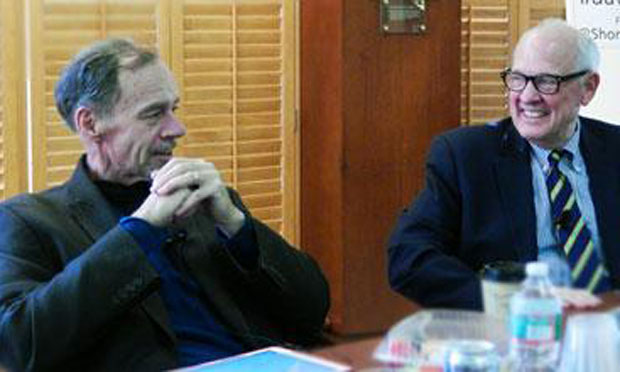
The Harvard Kennedy School’s Shorenstein Center hosts a weekly speaker series throughout the academic year. The events feature a wide variety of journalists and media thinkers — from David Carr and Bart Gellman to Andrea Mitchell and Ben Smith. See highlights from the fall 2013 semester here; and below are some recent conversations. Recent topics of discussion have ranged from the nature of new platforms and cutting-edge digital approaches to the challenges of foreign news coverage in a Web-driven environment.
A full list of past Shorenstein Center events can be found in our calendar archive. You can also subscribe to our iTunes feed to hear these and future conversations.
The following are highlights from 2014 so far:
_______
David Carr of the New York Times gives a talk titled “That Media Model Is So Yesterday: Catching Up With The Present Future We Are Living Through.” A leading media critic, Carr says that new “excellent and growing” sites such as Gawker, BuzzFeed and Business Insider are taking from the “great, vast sea of information and editing, selecting it, surfacing it” in ways that are visually appealing to consumers. They are putting “new skin on a constantly changing world of news,” he says. While “some call it aggregation [and] others call it stealing,” these sites are hiring more reporters and producing serious content.
[soundcloud url=”https://api.soundcloud.com/tracks/134416174″ params=”color=ff5500″ width=”100%” height=”166″ iframe=”true” /]
_______
BuzzFeed’s Ben Smith talks about “The New Newsroom… Is It the Future?” Smith, editor-in-chief of BuzzFeed, shares his insights on news models, and what works in today’s media ecosystem. He says Twitter has changed the structure of news distribution. Instead of news sites doing their own aggregation of content and tweaking SEO to index their sites and increase traffic, “Twitter is better at that.” Now, Smith says, sites no longer fight to get readers on to their front page because the front page is becoming more and more irrelevant. He says he believes traditional journalistic values can be maintained, even if the business models change.
[soundcloud url=”https://api.soundcloud.com/tracks/136722392″ params=”color=ff5500&auto_play=false&hide_related=false&show_artwork=true” width=”100%” height=”166″ iframe=”true” /]
_______
MSNBC’s Andrea Mitchell discusses “Covering Foreign Affairs While Keeping the Facts Straight.” Mitchell, a long-time global affairs reporter, says there is a “great appetite” for international coverage today, but she questions whether “we have the tools” to accurately report on crises, even with social media and other new technologies. “Nothing illustrates the dilemma we face more than Syria,” she says. Despite the increased media tempo driven by the Web, she advises other journalists to, above all else, first make sure the facts are correct. “Your biggest job is not to break a story,” she says, “it’s to stop an inaccurate story from getting out.”
[soundcloud url=”https://api.soundcloud.com/tracks/134485964″ params=”color=ff5500″ width=”100%” height=”166″ iframe=”true” /]
